Our view at Stack - Pipedrive is a robust CRM platform, offering automation, contact data collection, webhooks, AI-powered sales assistant, email communications, email marketing, and customisable sales pipeline workflows.
The sales advisor role can take various forms depending on the company and industry. While some employees stick to in-store activities, others guide prospects through remote processes and convert them into customers.
Whether you’re looking to start a career as a sales advisor or hire one, there are specific skills and steps you should know.
This article will cover what a sales advisor is and what they do. You’ll also learn three critical stages, whether you’re getting an interview or hiring for the role.
What is a sales advisor?
“Sales advisor” is a job title for employees who facilitate sales by advising customers on the most suitable product or service for their needs.
The role encompasses a range of responsibilities depending on the company and industry. Here are two top results for Indeed sales advisor job ads.
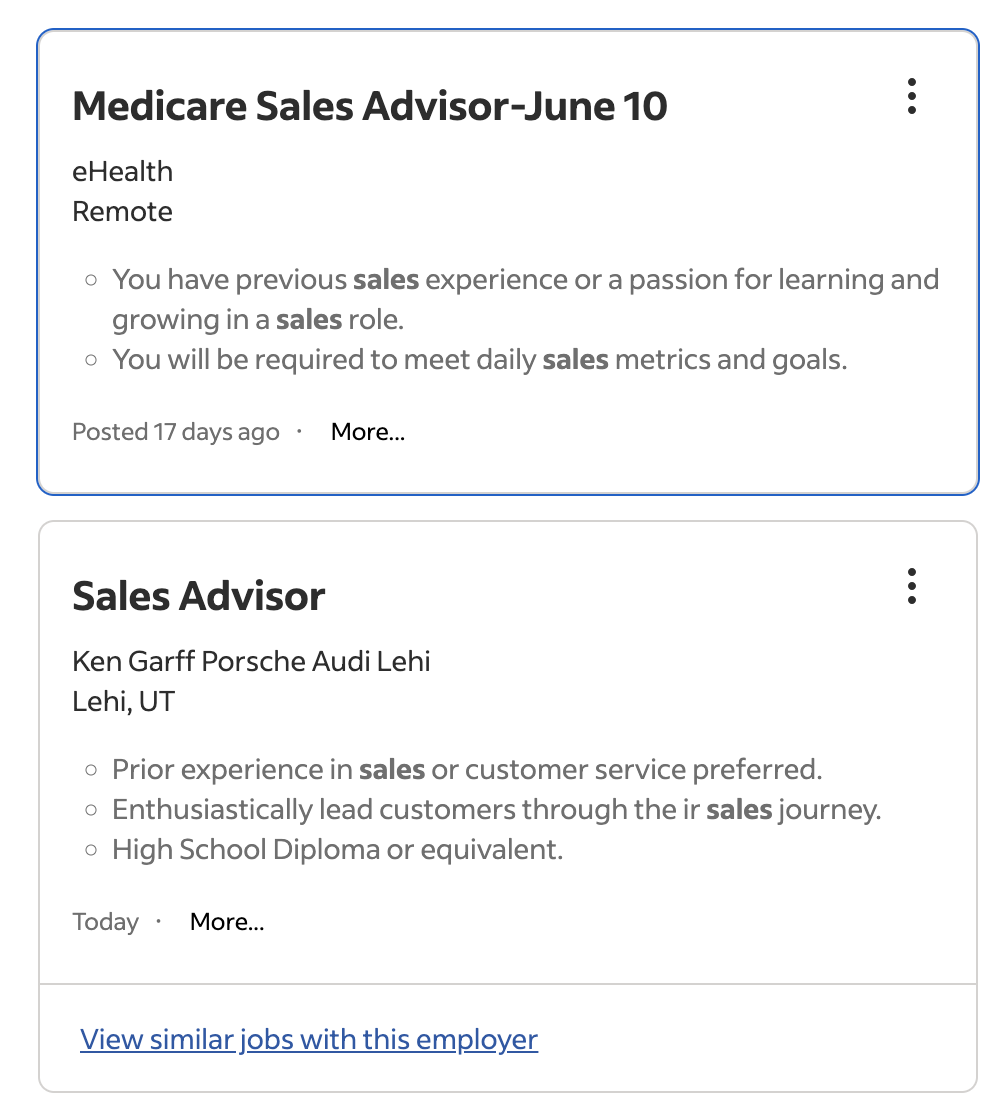
One role is a remote position for an online health marketplace, while the other involves working for a brick-and-mortar automotive store. Both share the same job title. However, the two have different day-to-day responsibilities.
Companies use various titles to represent the same role because there are many types of sales jobs, products and industries.
Here are a few of the most popular titles for salespeople and their typical definitions:
-
Sales representatives. Sales reps interact with potential customers to sell products or services. Business development reps (BDR) and sales development reps (SDR) handle distinct parts of the sales cycle.
-
Sales associates. Sales associates sell goods and services in physical stores.
-
Sales assistant. Sales assistants often work behind the cash register in a store, handling stock and assisting customers with questions.
-
Sales consultant. Sales consultants work with companies to devise sales strategies.
-
B2B sales advisor. B2B sales advisors sell products or services in the business-to-business industry (e.g., a company that sells accounting software).
-
B2C sales advisor. B2C sales advisors sell products or services in the business-to-consumer industry (e.g., grocery stores).
-
Account manager. Account managers have a post-sales role, focusing on building relationships with customers.
However, you should take these definitions with a grain of salt. Different companies may use the terms “sales representative”, “sales assistant” or “sales advisor” to refer to the same role.
Recommended reading

Inside sales vs. outside sales representatives
What does a sales advisor do?
The responsibilities of a sales advisor depend on the company and industry. Let’s examine the two Indeed job listings mentioned above.
The remote Medicare role involves guiding prospective customers through choosing health insurance coverage. Since it’s a remote position, the call center environment requires confidence in walking people through software virtually.
However, the automotive role involves working in a Utah dealership. Advisors here will sell physical vehicles, so face-to-face communication skills will be crucial.
Here’s another list of responsibilities for a sales advisor at a luxury fitness company.
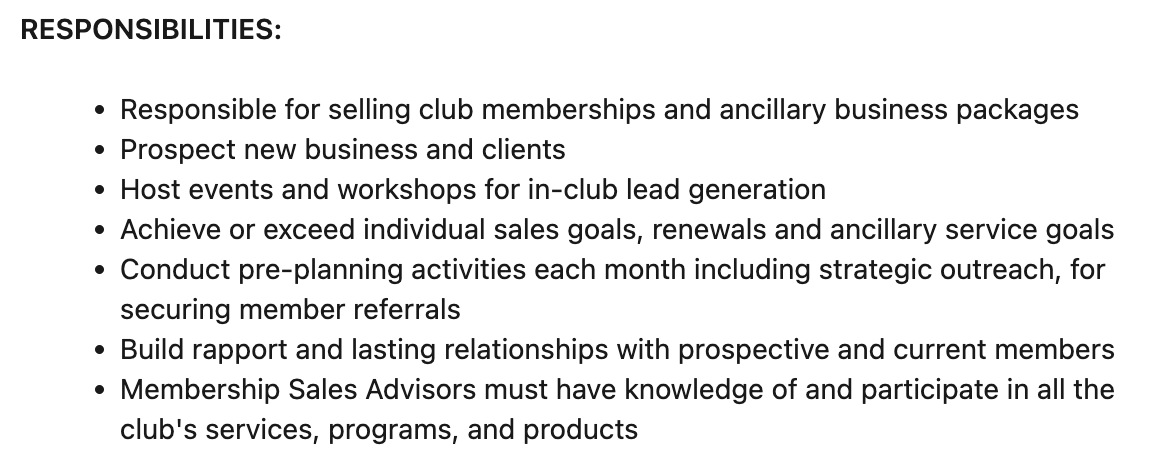
Event and workshop hosting experience is crucial for this role, as it will help build relationships with members that lead to customer retention.
While sales advisors have various responsibilities, here are some of the typical daily tasks:
-
Interacting with prospects, leads and customers in person or through various channels (phone calls, emails or social media messaging)
-
Advising potential customers on the services and products that best fit their needs
-
Providing top-tier customer service before, during and after sales
-
Processing sales transactions
-
Conducting sales demos or product presentations
-
Following up to ensure customer satisfaction
-
Monitoring inventory levels (e.g., restocking shelves or ordering products)
-
Participating in sales training and workshops to improve skills and product knowledge
It’s important to note that not all sales advisors will do all these tasks for their companies. It depends on the scope of the role.
Seal More Deals With Your Free Sales Communication Handbook
Learn to master your sales conversations with this 25 page ebook. Expect expert advice to help you level-up your soft skills and pump up your conversion rates.
5 skills to succeed as a sales advisor
While customer service experience is a bonus for all sales advisor roles, it isn’t always necessary.
Prospective advisors can get soft and hard skills through training and life experiences to succeed in customer-facing roles.
Here are five skills successful sales advisors possess.
1. Interpersonal skills
Successful advisors must communicate effectively with their sales team and customers to build rapport and sell products. However, interpersonal soft skills involve more than speaking confidently.
An advisor practicing active listening (an interpersonal skill) may detect a prospect’s concern that their video calling service isn’t a good fit for financial institutions.
With this information, the advisor redirects their sales pitch to cover the security features that hide sensitive data automatically when screen sharing.
Solid communication (i.e., being able to listen and share ideas without misinterpretation) helps advisors:
-
Understand someone’s needs and sell the best product
-
Explain product benefits clearly and persuasively
-
Handle sales objections and concerns confidently
-
Guide prospects through the sales process
-
Provide ongoing customer support
Communicating effectively with others is a crucial customer service skill that advisors can use to ensure everyone feels understood and satisfied.
How to build interpersonal skills: Practice active listening with friends and family so the technique becomes second nature. Watch communication coaching videos and observe how people with strong interpersonal skills guide conversations.
2. Problem-solving skills
The sales process often involves multiple obstacles and objections from potential customers. Advisors must navigate these issues through creative problem-solving and adapt their approach to close deals.
For example, an advisor may struggle to move prospects along the buying cycle after a demo. They can create a problem tree to diagnose potential reasons why.
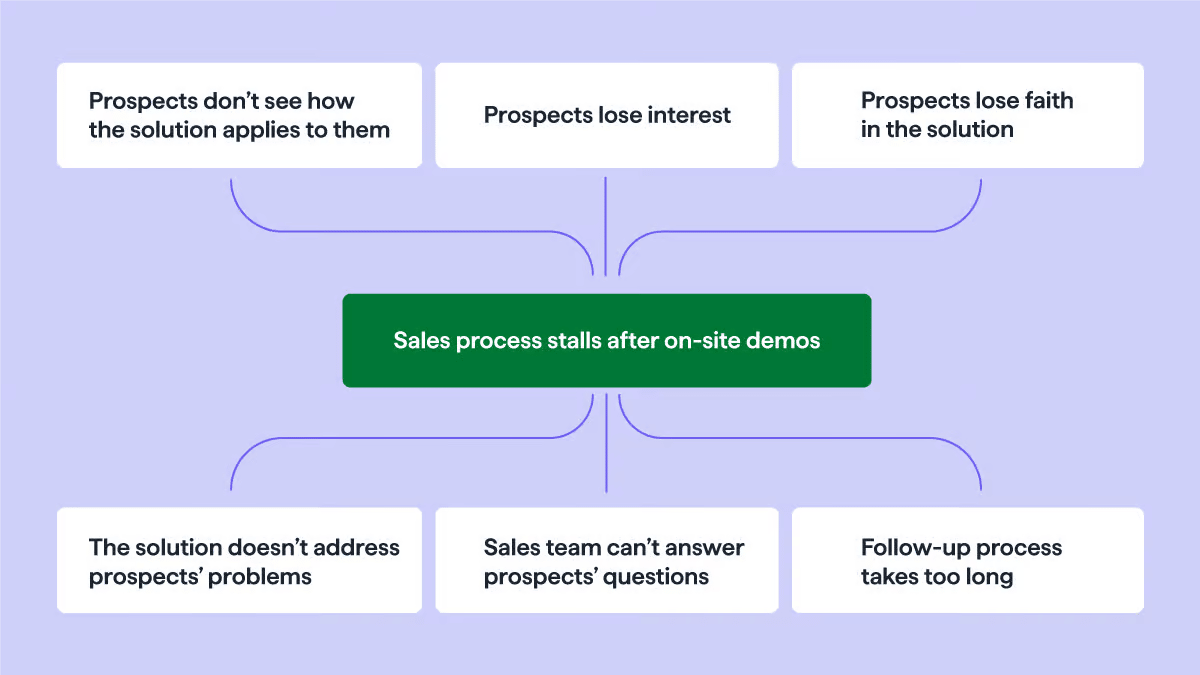
Visualizing root causes and replacing them with solutions helps the advisor figure out how to fix the problem. For example, organize sales team training to better answer prospects’ questions.
Other problem-solving strategies include:
-
Creating a list of possible solutions and using trial and error to test them (e.g., lowering prices)
-
Using the “5 Whys” (i.e., asking “Why” continually until you get to the root cause)
-
Implementing SWOT analysis (identifying strengths, weaknesses, opportunities and threats for each possible solution)
Each method can help the advisor solve complex problems without firsthand experience or expert help.
How to build problem-solving skills: Practice using the above methods to break down complex problems into smaller chunks and analyze them to find solutions.
3. Time management skills
Successful advisors must manage time effectively to nurture leads and follow up to boost sales. These time-saving skills help advisors understand which high-value activities they should prioritize to maximize productivity.
A company’s sales advisor can have diverse responsibilities, including administrative tasks, lead generation, relationship building and after-sales service.
Without a strategic plan, an advisor could spend hours on admin and leave limited time for meaningful activities. However, someone with excellent time management skills will ensure they focus on the tasks that help them close sales.
Sales advisors can implement time blocking to break down their workdays into shorter, more manageable segments. For example, they might split eight hours into one-hour or half-hour blocks and assign activities like “Send follow-up emails” or “Prospect on social media” to each.
Effective schedule management gives advisors enough time to provide excellent customer service and consistently hit sales targets. It also helps ensure salespeople don’t burn out or get overwhelmed.
How to build time management skills: Prioritize tasks based on importance and tackle them in set blocks of time to maintain focus and productivity. Research time management strategies like “Eat the Frog” and “Pomodoro” to reduce procrastination.
4. Proficiency with CRM or POS software
Sales advisors for online products must know how to use customer relationship management (CRM) software to manage contacts, relationships and deals. However, retail advisors will more likely have to work with a point of sale (POS) system.
An advisor gets a job with a graphic design software-as-a-service (SaaS) company, for example, and part of the role includes upselling the Premium plan to current customers.
The advisor needs accurate information to determine which customers are on the Basic plan and whether they will upgrade.
The SaaS company uses Pipedrive to separate sales pipelines, putting all won deals in a “Customers” pipeline. Within that pipeline, custom fields show which features the customer signed up for.
The advisor can use the software to prioritize communication and manage time effectively by reviewing previous outreach. For example, someone who declined an upgrade in the past likely isn’t worth pursuing again.
How to build CRM and POS experience: To gain experience using a CRM, sign up for Pipedrive’s free trial. Explore product videos to learn how different POS systems work, or volunteer at thrift stores for hands-on experience.
5. In-depth product knowledge
Sales advisors must know the product they’re selling to pinpoint prospects that fit ideal customer profiles (ICPs) and buyer personas. While ICPs allow you to group your target audience into segments, buyer personas help you communicate better with individuals in those groups.
New sales advisors will undergo company onboarding and training to learn about the product or service they’re selling. While the hiring process is detailed, the advisor should engage in additional self-learning to fill in knowledge gaps or learn about new products.
Head to the company’s site and read blog articles or customer stories from different industries.
For example, a salesperson who wants to stay current with how our product helps people can read our recent case studies to learn how customers in the construction, transportation and media industries use our CRM system.

Keeping up with product knowledge helps advisors learn how different customer groups use their products and why they buy. That way, they can sell better to similar prospects and handle objections more confidently.
How to build product knowledge: While onboarding for a new role, read the company’s content and knowledge base to accelerate learning. Ensure you can navigate the product like a user, recommend best-fit features and read negative reviews to craft responses in advance.
How to get an interview as a sales advisor
If you’re confident you have the skills to be a sales advisor, you may wonder what experience you need. A positive attitude and willingness to learn are crucial, but some industries require formal education or sales certifications.
Here are three steps for getting your first interview as a sales advisor.
Get the relevant education or related job experience
While some sales advisor roles don’t require a certain level of education, some in more technical fields like healthcare or engineering do.
You’ll likely know the industry in which you want to work. If not, visit job posting sites and review the requirements.
For example, prospective hires need the following to work as an advisor for electric vehicle manufacturer Rivian:
-
A minimum of six years of sales, retail, customer service or hospitality experience at a premium brand
-
Proven experience in a sales cycle-focused, commission-based environment
-
CRM experience
-
Working knowledge of Microsoft software
Advisors need one year of experience and a bachelor’s degree to work for the commercial property marketplace LoopNet.

Research your chosen niche and consider applying for the necessary courses or certifications. Otherwise, you may need to start with entry-level positions at other companies where you can build experience.
Study your chosen niche in depth
Prospective advisors need in-depth industry knowledge before applying for roles so they can answer interview questions effectively.
For example, an interviewer may ask how you’d handle the recent legislation that impacts cold email. If you haven’t followed industry news, you could lose out to someone who has.
Research your niche to learn about and stay updated on the industry. You can use methods like:
Even if you’ve completed formal education, this step is essential to know what’s new in your market and keep up with its evolution.
Note: When you get to the interview stage, research each company’s product and customer base in depth to give relevant and targeted answers.
Apply for sales advisor positions
With deep industry understanding, relevant education and years of experience under your belt, you’re ready to apply for roles. Search job posting sites and local job boards, or contact a recruiter to find and apply for sales advisor positions within your chosen niche.
Let’s say you want a position in the financial services industry. You may search “financial sales advisor” and find these roles on Glassdoor.
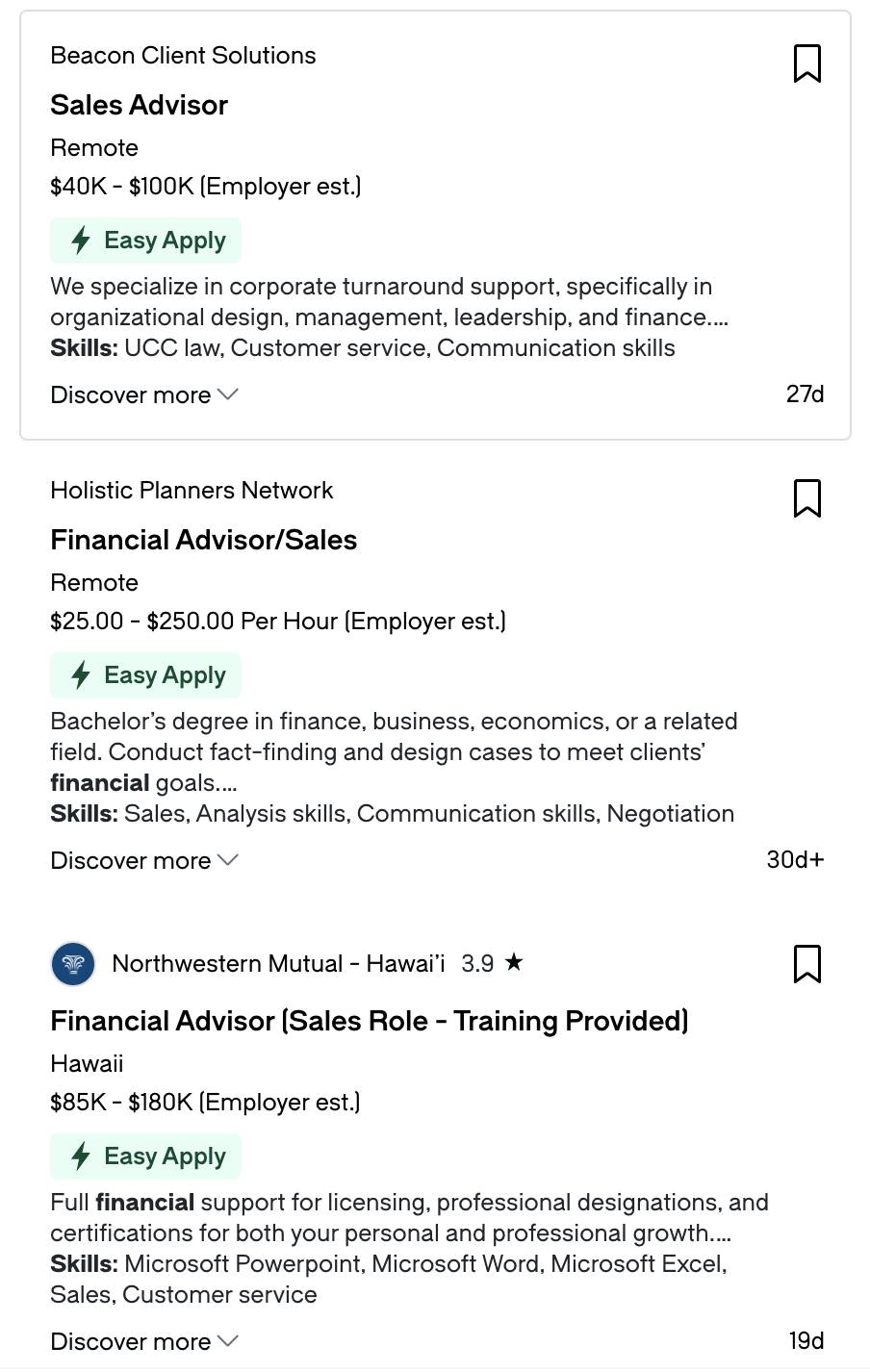
Register those that sound interesting and gather a list to compare salary, expectations and location before progressing.
Remember, the sales advisor role falls under a variety of job titles. A sales representative role with an enticing job description could also be a good fit.
How to hire a sales advisor
If you’re looking to hire a new advisor, narrowing down the experience, education and qualities you want candidates to have is essential.
Wherever you post your ad, remember to make it detailed and consistent, so all prospective hires have the information they need before applying.
Here are three tips for hiring the best-fit sales advisor for your team.
Figure out the type of sales advisor you need
Since the role specifications depend on the company, hiring managers must know the tasks they want to assign before advertising.
Let’s say you have both a brick-and-mortar and e-commerce store where you sell headphones. In that case, you must pinpoint where potential customers most need help.
Perhaps your in-store experience is already seamless, with assistants able to answer product questions and handle transactions. However, your customer surveys suggest some online users need help understanding the differences between models.
In that case, you may need remote sales advisors specializing in electronics who you can train to become product experts.
Advisors could hold video chats with potential customers to determine why they want to buy headphones (e.g., workouts or commuting) and which product fits their needs.
By adding additional qualifiers in the job title (e.g., remote technical sales advisor), you can narrow down your search to the most suitable prospective hires.
Create a sales advisor job description template
Your job description must be accurate and consistent across all sites.
You can use the information in this post and company-specific details to create a template with the correct requirements listed. As a baseline, you should include qualifications, responsibilities and benefits.
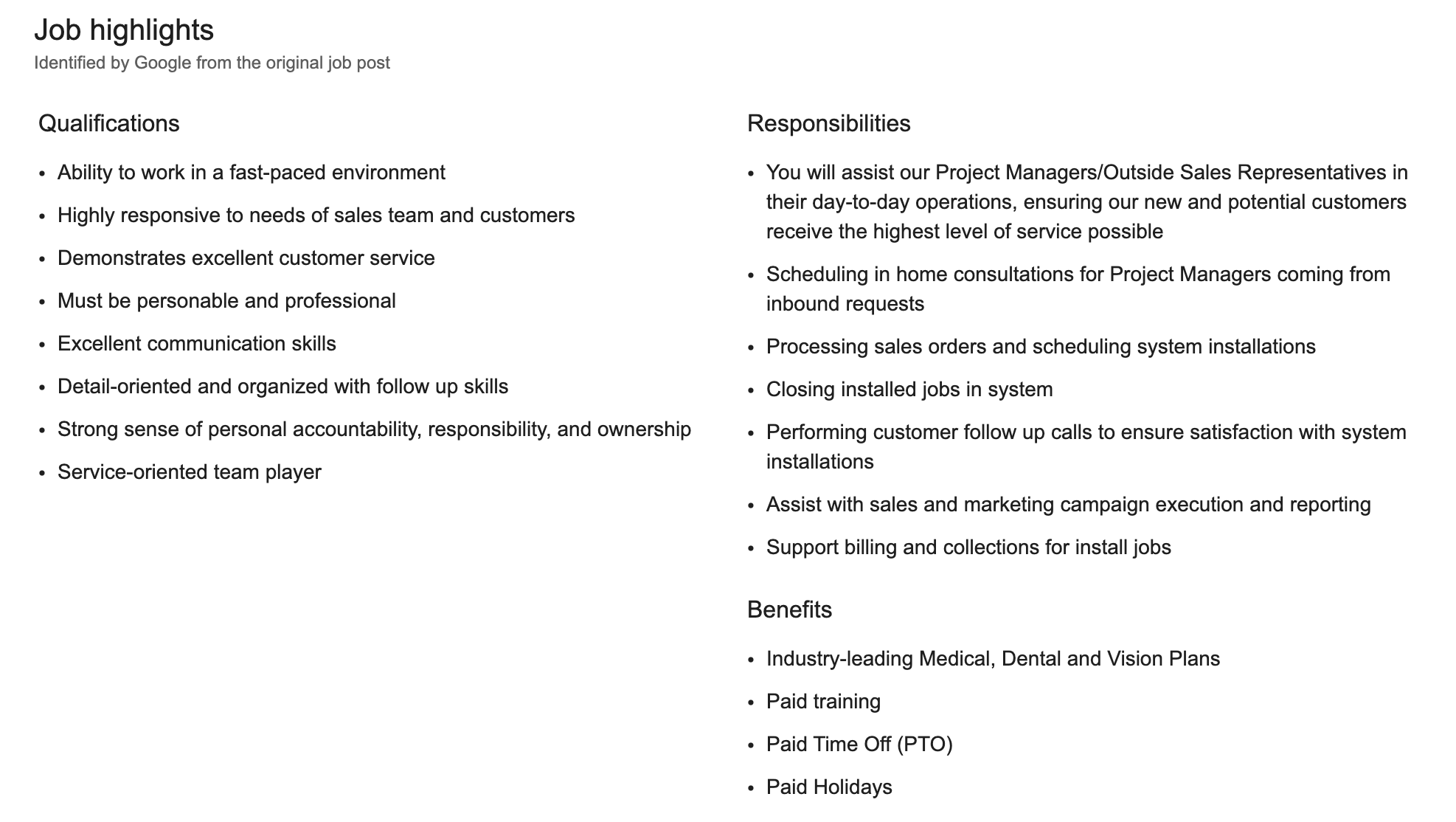
However, you can also include a company overview and job description to offer more details.
Let’s say you sell accounting software called Balance Buddy. Your sales advisor job template may look like this:
Job title: Sales Advisor
Company Overview:
Join the Balance Buddy team as we streamline accounting for businesses of all sizes. We want to simplify how companies manage their finances with innovative tools and unparalleled customer support.
Job Description:
As a sales advisor, you’ll drive revenue growth by identifying prospective clients, understanding their unique business needs and communicating how we can help. You’ll be responsible for building lasting relationships and providing expert guidance throughout the sales cycle.
Responsibilities:
1. Prospect potential leads through cold outreach, networking and referrals
2. Conduct thorough lead qualification to understand client financial processes and pain points
3. Present software demos and articulate our solution’s value
4. Develop tailored proposals and negotiate contracts to close deals
5. Collaborate with internal teams to ensure smooth onboarding
6. Keep up with industry trends and competitor offerings to stay ahead of the game
7. Meet and exceed sales quotas and key performance indicators (KPIs)
Required qualifications and skills:
1. High school diploma essential
2. Bachelor’s degree in Business Administration, Marketing, Finance or related field a bonus
3. Experience in B2B sales, preferably in the finance or technology industry
4. Strong understanding of accounting principles and financial processes
5. Excellent communication and sales presentation skills
6. Proven track record of building and maintaining customer relations
7. Ability to work independently and collaboratively with team members
Benefits:
1. Remote role with flexible working hours
2. Competitive compensation plan with uncapped commission structure
3. Comprehensive health benefits package, including medical and dental coverage
4. Generous vacation and paid time off policy
5. Dynamic and supportive work environment with opportunities for career advancement
6. Employee discounts on company products and services
If you don’t need prospective hires to meet every requirement, state that early so you have a varied pool of applicants.
Ask the right interview questions to find the ideal candidate
Once you have a list of potential candidates, you must narrow down your selection with the right interview questions.
These queries allow you to examine each person’s resume in detail to determine whether they’d be a good fit for your company and the role.
Here are a few interview questions the hiring manager of Balance Buddy might ask:
-
“Tell me about a time you aced a sales pitch. How did you find potential clients and convince them to seal the deal?”
-
“How do you keep up with trends in the accounting industry?”
-
“What problems do startups usually face when implementing new accounting software? How do you handle those objections?”
-
“Have you ever faced a tough question from a client during a sales demo? How did you turn it around to close the deal?”
-
“I see you’ve been through financial advisor sales training. What’s one of the most interesting things you learned?”
Notice each question is open-ended and doesn’t allow a “yes” or “no” answer. Structuring interviews in this way encourages candidates to discuss detailed experiences and offer specific examples that help you assess them quickly.
Final thoughts
While each sales advisor’s responsibilities and qualifications vary, all should possess specific sales skills, such as communication, problem-solving and time management.
When hiring for the role, consider that those with CRM or POS experience and in-depth product knowledge will take less time to train.
If you want to become proficient in a widely used CRM or upgrade your organization’s contact management, sign up for Pipedrive’s free trial today.
Download Your Guide to Preventing 5 Common Sales Mistakes
Always say the right thing with this guide to avoiding the frequently-made sales conversation mistakes.
If Pipedrive is of interest and you'd like more information, please do make contact or take a look in more detail here.
Credit: Original article published here.
